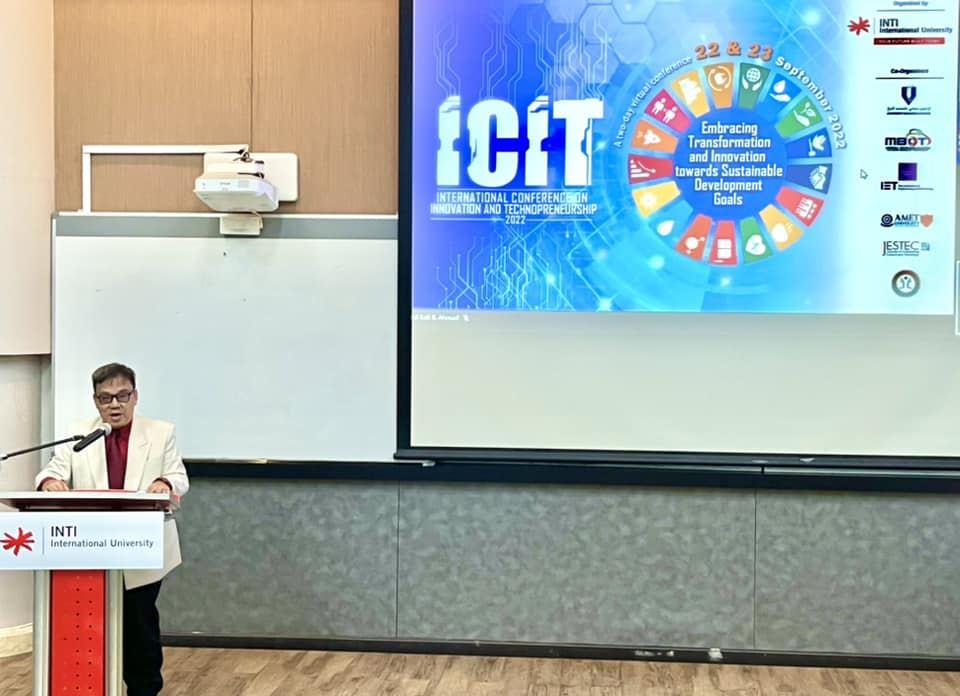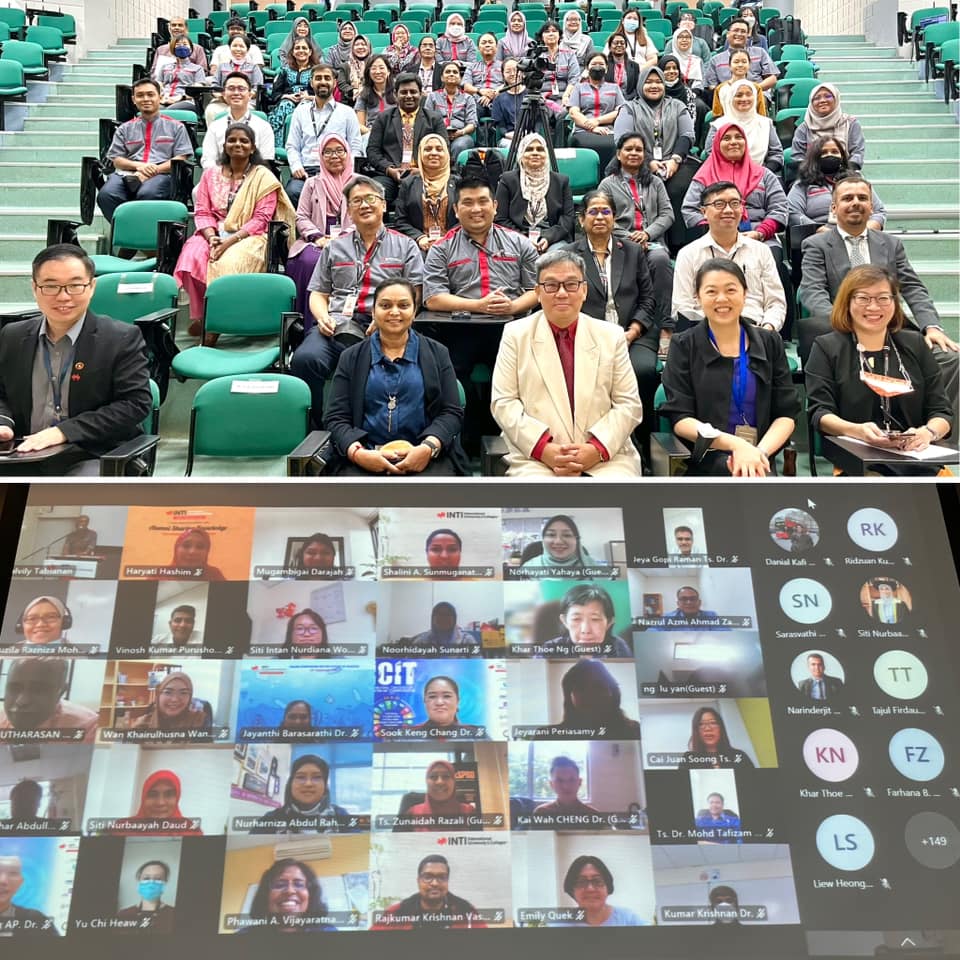INTI International University successfully hosted its 5th International Conference on Innovation and Technopreneurship (ICIT 2022) which provided a platform for academics and industry practitioners to share ideas and developments on innovation and technopreneurship that contribute to Sustainable Development Goals (SDGs).
The hybrid conference, held on 22 and 23 September, consisted of 10 tracks featuring speakers from Saudi Arabia, Hong Kong, and India who presented on the topic of ‘Innovation Towards Sustainable Development Goals’ on Day 1. Meanwhile, on Day 2, speakers from Indonesia, Lithuania, and India shared about ‘Technopreneurship Towards Sustainable Development Goals’, which highlighted the importance of synchronizing education, economic, and personal growth to achieve SDGs to overcome the struggles following COVID-19.
Dr. Joseph Lee, Vice Chancellor of INTI International University, said they were delighted to be welcoming participants from over 20 countries to the conference.

Dr. Joseph Lee, Vice-Chancellor of INTI International University, delivering his opening remarks during the 5th International Conference on Innovation and Technopreneurship (ICIT 2022) at INTI International University.
“As a globally engaged institution, INTI International University persistently seeks cooperation with higher education institutions, government, and non-governmental entities throughout the world. We wish to build new partnerships and bring our existing partnerships to a new level – transforming them into a more sensible alliance of action and projects. While this is a call for a new form of working together, we will build on what we already have and go from strength to strength,” he said.
He added that with businesses facing exceptional challenges around the world, technology and innovation have become indispensable.
“Let’s think about and look for the best way to understand and respond quickly to any shifts affecting our environment and how we could progress in this demanding time to contribute to our environment,” said Dr. Joseph.
Meanwhile, conference chair Associate Professor Ir. Dr. Malathy Batumalay lauded the speakers for their insightful presentations.
On the first day of the conference, Dr. Ridzuan Kushairi Bin Mohd Ramli, Principal Assistant Director of Equity Development Division, Economic Planning Unit from the Prime Minister’s Department of Malaysia delivered a keynote on “Innovation Towards Sustainable Development Goals (SDG)” in which he addressed the nation’s socioeconomic development after independence.
He said that Malaysia has experienced significant change in its socioeconomic development after its independence.
“A majority of people lived in poverty, had poor health with a low unemployment and education rate at that time. But due to people’s desire for change, the revolution included changes in both the epidemiological and demographic landscape contributing to socio-economic improvements entirely,” added Dr. Ridzuan.
Explaining further about the socioeconomic changes, he stressed that after the Malaysian Productivity Blueprint was introduced in 2017, the need for our society to adopt the IR4.0 blueprint is crucial.
“Through a rapid digital change over the past ten years, the adoption of technologies requires much attention from all sectors of the nation. It is not just how we govern our innovations, but to educate and equip our society with knowledge that is able to speed up human connectivity, changing how we live and communicate,” conclude Dr. Ridzuan.
Meanwhile, Prof. Dato’ Dr. Aileen Tan, Director of Centre for Marine & Coastal Studies, Universiti Sains Malaysia (USM) gave a keynote speed on “Bluefood Sustainable Aquaculture & SDGs”. She elaborated on how our oceans are changing and the impacts on the nation.
“Presently, the temperature of the ocean is hotter, sourer, and acidic due to excessive carbon dioxide dissolving into the oceans. Imagine the future of oceans that continues to be challenging and under threat,” said Prof. Dr. Aileen.
In efforts to safeguard the world’s oceans, she elaborated on the power of aquatic food on the environment and how society can contribute to it.
“Malaysia is a maritime nation, and a lot of our industry is from the ocean. There is more power in aquatic food than we realize. Hence, we hope to continuously prevent and reduce marine pollution,” she said.
Meanwhile, Prof. Ts. Dr. Kamal Zuhairi Zamli, Deputy Vice-Chancellor (Research & Innovation) at Universiti Malaysia Pahang (UMP), gave a presentation titled “On Modelling and Optimization of Team Formation Problem” and how distributed teams are the future of work while relating it with SDGs.
“We are now in the era of big data and rapid technological advancement, and not all required expertise resides in a single department or organization. It is costly to do so. Thus, we need a systematic way to form a team,” he said.
He explained that our world is constantly striving to be consistent with the ever-evolving technology, thus the work structure and dynamic team must be changed too.
“The new system that is called automated team formation requires most organizations to outsource workers or their work elsewhere to other pools of available experts across the globe. These experts will only be hired as per project needs, hence, allowing the reduction of organization operation costs,” added Prof. Kamal.
He said that this new work structure can address Goal 8: Decent Work and Economic Growth from the 17 SDGs.
During the final day of ICIT 2022, a keynote entitled “Technopreneurship Towards Sustainable Development Goals (SDG)” was presented.
Prof. Dr. Fabio Lazzaretto, Coordinator of the Centre for Research, Entrepreneurship and Innovation, University of Western Santa Catarina (UNOESC), shared about the research, innovation, and technopreneurship in relation to SDGs at the UNOESC.

(From left to right, front row) Prof. Dr. Wong Ling Shing, Pro Vice-Chancellor (Research and Knowledge Transfer) of INTI International University, Associate Professor Ir. Dr. Malathy Batumalay, conference chair of the ICIT 2022, Dr. Joseph Lee, Vice-Chancellor of INTI International University, Dr. Lai Yin Ling, Pro Vice-Chancellor (Academic Operations) of INTI International University, and Ms. Wong Siew Fong, Pro Vice-Chancellor (General Affairs) of INTI International University and participants pose for a group photo after the hybrid event.
Prof. Dr. Fabio, who is also a professor and researcher at the university, highlighted a compelling project at UNOESC which emphasized the applicability of constructed wetlands in the decentralized treatment of sewage.
“The systems used in sewage treatment are technological alternatives for adequate sanitation in small communities, peri-urban and rural areas contributing to 6 SDGs,” said Prof. Dr. Fabio
The project aims to meet 6 SDGs, namely Zero Hunger and Sustainable Agriculture (Goal 2) to ensurethat people everywhere have quality food to lead a healthy life; Good Health, and Well-being (Goal 3) which aims to ensure healthy lives and promote well-being for all at all ages; Clean Water and Sanitation (Goal 6) for the availability and sustainable management of water and sanitation for all; Sustainable Cities and Communities (Goal 11) to make cities and human settlements inclusive, safe, resilient, and sustainable; Sustainable Consumption and Production (Goal 12) to ensure sustainable consumption and production patterns worldwide and Life Below Water (Goal 14) to ensure that Earth is habitable for humankind.
In efforts to embrace innovation and technopreneurship, he also highlighted about eco-friendly textile created without chemicals or pesticides and in a manner that is kind to the environment.
“We used a textile shredder to reduce environmental impacts which can reduce textile wastes that add value to good clean production practices,” conclude Prof. Fabio
Meanwhile, the final keynote was delivered by Prof. Dr. A.S Ramnarayanan, Head of International Relations, Gitarattan International Business School New Delhi, India, addressed the topic of the importance of technopreneurs in today’s digital era and how to become successful.
Prof. Dr. Ramnarayanan also considered technopreneurship as the next big thing in the start-up ecosystem.
“A technopreneur starts with a new idea. This idea has the potential to change the way society has functioned traditionally. They create a new product or come up with a solution to some problem using technology. Therefore, science and technology are truly the hallmarks of technopreneurship,” added Prof. Dr.Ramnarayanan
He elaborated on critical areas that a technopreneur needs to focus on to be successful and how innovative ideas can sound promising but what matters is the execution.
“Exploring uncharted territories and being persistent are essential for any technopreneur. The will to never give up, even after failures, is what distinguishes them from the rest of the population. But criteria like problem-solving skills, the know-of building a team, and strategic decision skills are future-proof skillsets that are viable in the long run,” he added.
He concluded that technopreneurship is all about making improvements in life, an organization, a nation, and the world. The critical element is the innovative use of technology and sheer dedication and hard work.
Collaborators for the ICIT 2022 were the Faculty of Computing at Universiti Malaysia Pahang (UMP), Institution of Engineering and Technology (IET), UK, Malaysia Board of Technologists (MBOT), AMET University, India, Journal of Engineering Science and Technology (JESTEC) and Wekerle Business School, Hungary.